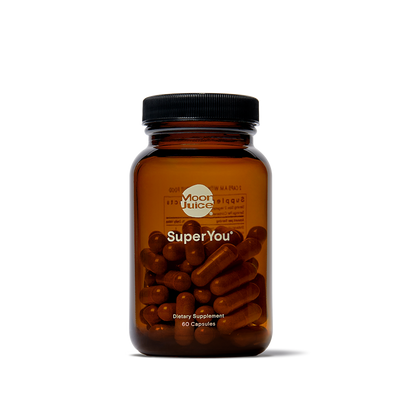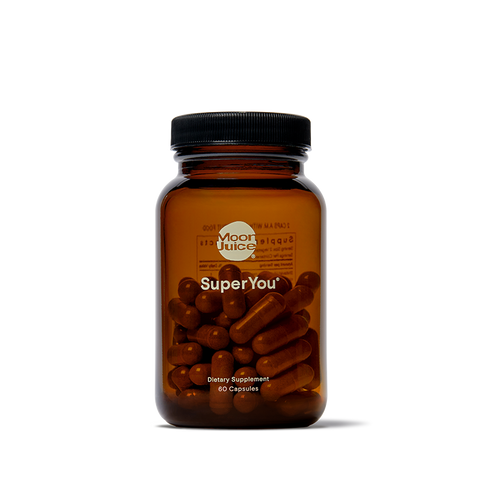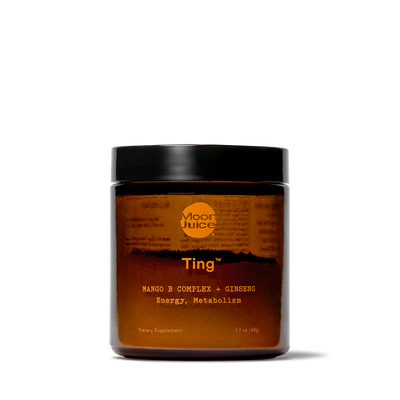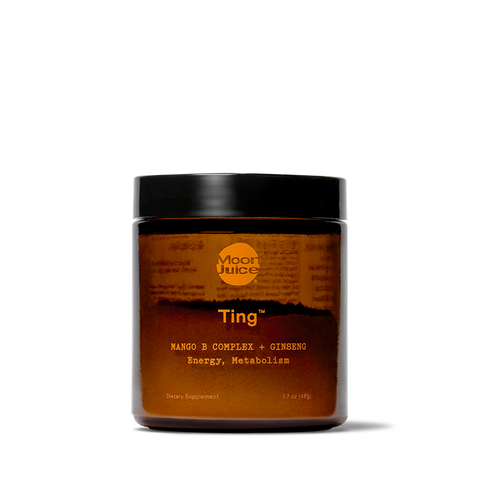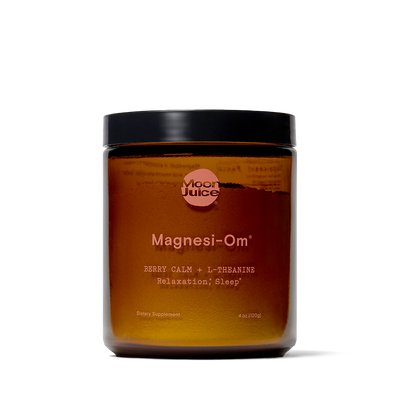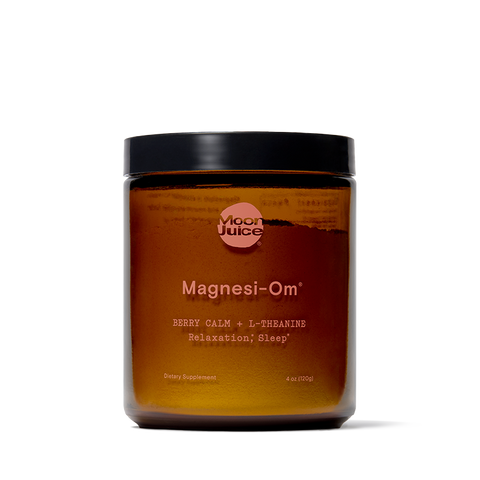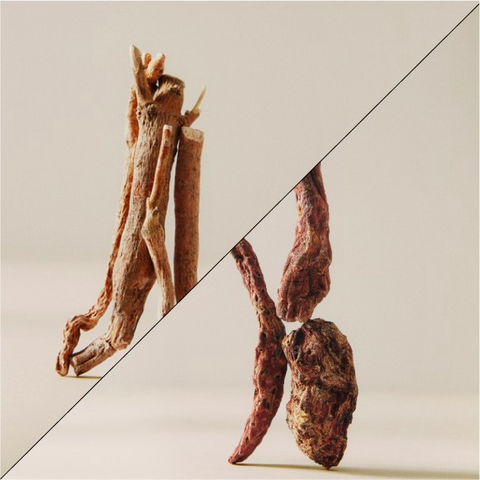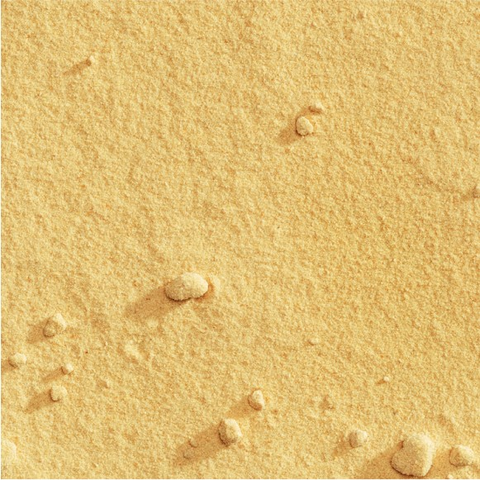If you’ve been feeling low, meh, or blah lately, it could be a sign of a mood imbalance in your body. Key nutrient deficiencies can result in low mood, and certain mood boosting vitamins can act as precursors to the “happy hormones.” Adaptogens can help counter stress so you can focus on enjoying the moment. Ahead, everything you need to know about vitamins that help with mood and the best mood boosting supplements to try.
1. B Vitamins
B Vitamins are a class of water-soluble vitamins that play an important role in your health, helping your body with cell metabolism and the synthesis of red blood cells. Several B’s, particularly B6, B9, and B12, have been linked to improvements in mood. B12 specifically plays an important role in the synthesis and metabolism of serotonin, a feel-good neurotransmitter.
You can find B Vitamins naturally in foods like leafy vegetables and animal sources of protein. If you’re feeling meh, look to your diet, as deficiency in B Vitamins can result in fatigue and low mood. With B12 in particular, which is present in poultry, fish, meats, eggs, and dairy products, those with a vegetarian or vegan diet are likely to have a hard time meeting their intake needs without the help of supplementation.
Whether you eat strictly plant-based or just want to round out your B12, Ting™, our natural energy supplement, contains Methylated B12 to support healthy serotonin levels* and Vitamin B Complex (Vitamin B1, B2, B3 Niacin, B5, B6, B9) to help your body convert food into energy.*
2. Vitamin D
Also known as the sunshine vitamin, Vitamin D plays many essential roles, including helping your body regulate dopamine, a neurotransmitter known for sending signals to your brain that result in pleasurable, rewarding feelings and increased motivation. When you get a runner’s high, that’s dopamine working together with endorphins to make your body feel good.
In the United States, about 35% of adults are Vitamin D deficient, so supplementing may be helpful. You can get your vitamin D intake through sunshine, foods like mushrooms, or immune support supplements like SuperPower®. This clinical strength blend highlights four fundamental health-boosting ingredients including Liposomal Vitamin C, Vitamin D, Zinc, and Reishi.
3. Magnesium
Magnesium is an essential mineral and electrolyte that’s responsible for over 300 enzymatic functions in your body. Every cell needs magnesium to function, which is why everyone should take a Magnesium supplement on a daily basis. Yet more than 50% of the US has a magnesium deficiency, which can lead to symptoms like brain fog, insomnia, headaches, fatigue, and low mood.
Getting adequate levels of this important micronutrient can help protect against stress and achieve a sense of calm on a cellular level. During your body’s stress response, cells with a higher concentration of Magnesium can more easily regulate stress and enhance feelings of relaxation. Magnesium can give you the foundation to support a better mood and your overall well-being.
You can find Magnesium in foods like beans, spinach, dark chocolate, bananas, and pumpkin seeds. If you’re one of the many who may need more Magnesium, you might also want to try a Magnesium supplement to keep your body in balance. Magnesi-Om® contains 3 bioavailable forms of Magnesium to help improve mood, relaxation, and other aspects of your wellbeing.
4. Mucuna
A type of tropical bean native to Africa, China, and India, Mucuna pruriens has been shown to help boost dopamine levels in humans. The most significant bioactive found in Mucuna is called L-dopa, an amino acid precursor needed for your brain to create dopamine.
Mucuna is also considered an adaptogen, traditionally used in Ayurveda and TCM for a happier brain and healthier mood.
5. Ashwagandha
Ashwagandha has been heavily relied upon for centuries in Ayurvedic medicine to harmonize mind, body, and spirit.* This adaptogenic herb has been clinically shown to help reduce stress, regulate levels of the stress hormone cortisol, and reduce irritability.
In addition to an Ashwagandha powder supplement that you can add to coffee and smoothies, you can also find Ashwagandha in SuperYou®, our natural stress supplement that includes a blend of 4 potent adaptogens designed to help reduce the effects of stress in order to improve energy, mood, and focus.*
6. Omega-3 Fatty Acids
The beautiful healthy fats found in chia seeds, flax seeds, walnuts, and fatty fish, may play a key role in mood enhancement. While the link between Omega-3 fatty acids and mood isn’t yet fully understood, we know that this fatty acid is a nutritious, heart-healthy nutrient important for brain health throughout your life.
7. Gingko
Gingko Biloba, an ancient herb traditionally used for cognitive support, may also be a helpful dietary supplement to improve mood regulation. A test tube study found that Gingko extract appeared to increase dopamine secretion by reducing oxidative stress in the body.
Sign Up, Nerd Out
Get wellness tips, education, and recipes
delivered straight to your inbox.
Get wellness tips, education,
and recipes delivered
straight to your inbox.
8. Ginseng
Ginseng is an adaptogenic herb native to China that has been used for centuries in TCM and has been shown to potentially enhance brain function, mood, and emotional well-being. This mountainous root is known for its ability to nourish the adrenals and help restore natural energy in the body.
Ginseng is available in different forms, from teas to powders. For caffeine-free energy and mood support, try our Ting™ dietary supplement.
9. L-Theanine
L-Theanine is a naturally occurring amino acid found in tea leaves, particularly green tea. It’s known for its ability to promote relaxation and reduce stress without making you drowsy. This unique compound is also known to increase the production of mood-boosting neurotransmitters like serotonin and dopamine.
L-Theanine also has the ability to cross the blood-brain barrier, allowing it to directly impact your brain function. Its calming effects are attributed to its ability to increase alpha brain waves, which help contribute to improved focus and concentration while simultaneously fostering a sense of tranquility. You can find L-Theanine supplemented in Magnesi-Om®.
10. St. John’s Wort
St. John’s Wort, or Hypericum perforatum, is an herb with a long history of traditional use for mood-related issues. Believed to impact neurotransmitters like serotonin, dopamine, and norepinephrine, it’s been recognized for its potential as a natural mood stabilizer. It’s important to mention that St. John’s Wort may interact with certain medications, including antidepressants, so it’s always best to talk to your doctor before using it in tandem with other meds.
11. Probiotics
A healthy gut microbiome is linked to improved mood. The connection between gut health and mood is a growing area of research, and probiotics, or the beneficial bacteria that live in your gut, play a crucial role in bolstering a positive mood. While “bad” gut bacteria can decrease dopamine production, probiotics have the ability to actually increase dopamine levels.
These live microorganisms are found in fermented foods like yogurt, kefir, and sauerkraut, as well as in supplementation form. Just note that live cultures are sensitive to temperature and can lose their potency in certain processed foods.
12. Zinc
Zinc is an essential trace element for various physiological functions, including immune balance, wound healing, and cognitive processes. While it’s often recognized for its immune-balancing properties, Zinc also plays a role in mood regulation and emotional well-being. It’s involved in the synthesis and regulation of happiness chemicals like serotonin and dopamine, which can help you enjoy a stabilized mood. A 2011 study also suggests that low Zinc levels may result in lower levels of gamma-aminobutyric acid (GABA) in the brain. This is important because GABA is a neurotransmitter that helps block signals to lower worry, fear, and stress levels.
Food sources rich in Zinc include meats, dairy products, nuts, and seeds. But if you have difficulty obtaining sufficient Zinc through your diet, natural supplement options are also available. By ensuring an adequate intake, you can support your body’s ability to produce and regulate neurotransmitters.
Takeaways
If you’re not feeling yourself lately and low mood is to blame, there’s a bounty in nature that can help bring your body back into blissful balance. Getting plenty of exercise, sleep, and addressing nutritional deficiencies is a powerful first step, but if you find you need extra mood enhancement, these natural vitamins and mood supplements can become your best friends. As always, talk to a trusted doctor about your health, including your mental health, to see what mood-boosting supplements, or potentially other steps, are best for you.
While no single mood-boosting herb, vitamin, or adaptogen supplement can take the place of proper health care, diet, or professional counsel, these supplements can help build a foundation for health and happiness. Try one of these best vitamins or supplements for mood today.
Sources
- Kennedy D. O. (2016). B Vitamins and the Brain: Mechanisms, Dose and Efficacy--A Review. Nutrients, 8(2), 68. https://www.ncbi.nlm.nih.gov/pmc/articles/PMC4772032/
- Seppälä, J., Koponen, H., Kautiainen, H., Eriksson, J. G., Kampman, O., Leiviskä, J., Männistö, S., Mäntyselkä, P., Oksa, H., Ovaskainen, Y., Viikki, M., Vanhala, M., & Seppälä, J. (2013). Association between vitamin b12 levels and melancholic depressive symptoms: a Finnish population-based study. BMC psychiatry, 13, 145. https://www.ncbi.nlm.nih.gov/pmc/articles/PMC3674945/
- Pertile, R. A., Cui, X., & Eyles, D. W. (2016). Vitamin D signaling and the differentiation of developing dopamine systems. Neuroscience, 333, 193–203. https://pubmed.ncbi.nlm.nih.gov/27450565/
- National Library of Medicine, Vitamin D Deficiency. https://www.ncbi.nlm.nih.gov/books/NBK532266/
- Cardoso, C. C., Lobato, K. R., Binfaré, R. W., Ferreira, P. K., Rosa, A. O., Santos, A. R., & Rodrigues, A. L. (2009). Evidence for the involvement of the monoaminergic system in the antidepressant-like effect of magnesium. Progress in neuro-psychopharmacology & biological psychiatry, 33(2), 235–242. https://pubmed.ncbi.nlm.nih.gov/19059299/
- Shukla, K. K., Mahdi, A. A., Ahmad, M. K., Shankhwar, S. N., Rajender, S., & Jaiswar, S. P. (2009). Mucuna pruriens improves male fertility by its action on the hypothalamus-pituitary-gonadal axis. Fertility and sterility, 92(6), 1934–1940. https://pubmed.ncbi.nlm.nih.gov/18973898/
- Tomita-Yokotani, K., Hashimoto, H., Fujii, Y., Nakamura, T., & Yamashita, M. (2004). Distribution of L-DOPA in the root of velvet bean plant (Mucuna pruriens L.) and gravity. Uchu Seibutsu Kagaku, 18(3), 165–166. https://pubmed.ncbi.nlm.nih.gov/15858373/
- Ramassamy, C., Naudin, B., Christen, Y., Clostre, F., & Costentin, J. (1992). Prevention by Ginkgo biloba extract (EGb 761) and trolox C of the decrease in synaptosomal dopamine or serotonin uptake following incubation. Biochemical pharmacology, 44(12), 2395–2401. https://pubmed.ncbi.nlm.nih.gov/1472105/
- National Library of Medicine, Effects of ginseng on stress-related depression, anxiety, and the hypothalamic–pituitary–adrenal axis. https://www.ncbi.nlm.nih.gov/pmc/articles/PMC5628357/
- Shim, I. S., Won, J. S., Lee, J. K., Song, D. K., Kim, S. E., Huh, S. O., Kim, Y. H., & Suh, H. W. (2000). Modulatory effect of ginseng total saponin on dopamine release and tyrosine hydroxylase gene expression induced by nicotine in the rat. Journal of ethnopharmacology, 70(2), 161–169. https://pubmed.ncbi.nlm.nih.gov/10771206/
- Kim, S. E., Shim, I., Chung, J. K., & Lee, M. C. (2006). Effect of ginseng saponins on enhanced dopaminergic transmission and locomotor hyperactivity induced by nicotine. Neuropsychopharmacology : official publication of the American College of Neuropsychopharmacology, 31(8), 1714–1721. https://pubmed.ncbi.nlm.nih.gov/16251992/
- Jun, Y. L., Bae, C. H., Kim, D., Koo, S., & Kim, S. (2015). Korean Red Ginseng protects dopaminergic neurons by suppressing the cleavage of p35 to p25 in a Parkinson's disease mouse model. Journal of ginseng research, 39(2), 148–154. https://www.ncbi.nlm.nih.gov/pmc/articles/PMC4452523/
- Ong, W. Y., Farooqui, T., Koh, H. L., Farooqui, A. A., & Ling, E. A. (2015). Protective effects of ginseng on neurological disorders. Frontiers in aging neuroscience, 7, 129. https://www.ncbi.nlm.nih.gov/pmc/articles/PMC4503934/
- ScienceDirect, Theanine - An Overview https://www.sciencedirect.com/topics/medicine-and-dentistry/theanine#:~:text=Theanine%20crosses%20the%20blood%E2%80%93brain,have%20been%20reported%20thus%20far
- Chapman, C. M., Gibson, G. R., & Rowland, I. (2011). Health benefits of probiotics: are mixtures more effective than single strains?. European journal of nutrition, 50(1), 1–17. https://pubmed.ncbi.nlm.nih.gov/21229254/
- Wall, R., Cryan, J. F., Ross, R. P., Fitzgerald, G. F., Dinan, T. G., & Stanton, C. (2014). Bacterial neuroactive compounds produced by psychobiotics. Advances in experimental medicine and biology, 817, 221–239. https://pubmed.ncbi.nlm.nih.gov/24997036/
- Gayle, D. A., Ling, Z., Tong, C., Landers, T., Lipton, J. W., & Carvey, P. M. (2002). Lipopolysaccharide (LPS)-induced dopamine cell loss in culture: roles of tumor necrosis factor-alpha, interleukin-1beta, and nitric oxide. Brain research. Developmental brain research, 133(1), 27–35. https://pubmed.ncbi.nlm.nih.gov/11850061/
- Liu, W. H., Chuang, H. L., Huang, Y. T., Wu, C. C., Chou, G. T., Wang, S., & Tsai, Y. C. (2016). Alteration of behavior and monoamine levels attributable to Lactobacillus plantarum PS128 in germ-free mice. Behavioural brain research, 298(Pt B), 202–209. https://pubmed.ncbi.nlm.nih.gov/26522841/
- Liu, Y. W., Liu, W. H., Wu, C. C., Juan, Y. C., Wu, Y. C., Tsai, H. P., Wang, S., & Tsai, Y. C. (2016). Psychotropic effects of Lactobacillus plantarum PS128 in early life-stressed and naïve adult mice. Brain research, 1631, 1–12. https://pubmed.ncbi.nlm.nih.gov/26620542/
- Melo, F. H., Moura, B. A., de Sousa, D. P., de Vasconcelos, S. M., Macedo, D. S., Fonteles, M. M., Viana, G. S., & de Sousa, F. C. (2011). Antidepressant-like effect of carvacrol (5-Isopropyl-2-methylphenol) in mice: involvement of dopaminergic system. Fundamental & clinical pharmacology, 25(3), 362–367. https://pubmed.ncbi.nlm.nih.gov/20608992/
- Mechan, A. O., Fowler, A., Seifert, N., Rieger, H., Wöhrle, T., Etheve, S., Wyss, A., Schüler, G., Colletto, B., Kilpert, C., Aston, J., Elliott, J. M., Goralczyk, R., & Mohajeri, M. H. (2011). Monoamine reuptake inhibition and mood-enhancing potential of a specified oregano extract. The British journal of nutrition, 105(8), 1150–1163. https://pubmed.ncbi.nlm.nih.gov/21205415/
- Frontiers, The Emerging Role for Zinc in Depression and Psychosis https://www.frontiersin.org/articles/10.3389/fphar.2017.00414/full
- Russo A. J. (2011). Decreased zinc and increased copper in individuals with anxiety. Nutrition and metabolic insights, 4, 1–5. https://www.ncbi.nlm.nih.gov/pmc/articles/PMC3738454/




